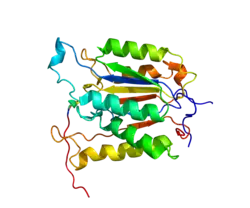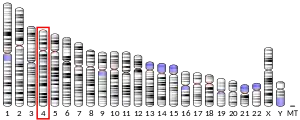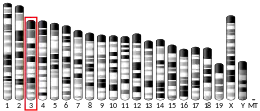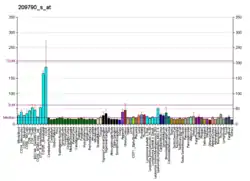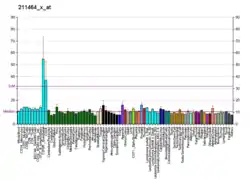Caspase-6 is an enzyme that in humans is encoded by the CASP6 gene.[5][6] CASP6 orthologs[7] have been identified in numerous mammals for which complete genome data are available. Unique orthologs are also present in birds, lizards, lissamphibians, and teleosts. Caspase-6 has known functions in apoptosis,[8] early immune response[9][10] and neurodegeneration in Huntington's and Alzheimer's disease.[11]
Function
This gene encodes a protein that is a member of the cysteine-aspartic acid protease (caspase) family. Sequential activation of caspases plays a central role in the execution-phase of cell apoptosis.[8] Caspases exist as inactive proenzymes that undergo proteolytic processing at conserved aspartic residues to produce two subunits, large and small, that dimerize to form the active enzyme. This protein is processed by caspases 7, 8 and 10, and is thought to function as a downstream enzyme in the caspase activation cascade. Caspase 6 can also undergo self-processing without other members of the caspase family.[12] Alternative splicing of this gene results in two transcript variants that encode different isoforms.[13]
Caspase-6 plays a role in the early immune response via de-repression. It reduces the expression of the immunosuppressant cytokine interleukin-10[9] and cleaves the macrophage suppressing IRAK-M.[10]
With respect to neurodegeneration, caspase-6 cleaves HTT in Huntington's and APP in Alzheimer's disease. Resulting in both cases in protein aggregation of the fragments.[11]
Interactions
Caspase 6 has been shown to interact with Caspase 8.[14][15][16]
See also
References
- 1 2 3 GRCh38: Ensembl release 89: ENSG00000138794 - Ensembl, May 2017
- 1 2 3 GRCm38: Ensembl release 89: ENSMUSG00000027997 - Ensembl, May 2017
- ↑ "Human PubMed Reference:". National Center for Biotechnology Information, U.S. National Library of Medicine.
- ↑ "Mouse PubMed Reference:". National Center for Biotechnology Information, U.S. National Library of Medicine.
- ↑ Tiso N, Pallavicini A, Muraro T, Zimbello R, Apolloni E, Valle G, Lanfranchi G, Danieli GA (Oct 1996). "Chromosomal localization of the human genes, CPP32, Mch2, Mch3, and Ich-1, involved in cellular apoptosis". Biochem Biophys Res Commun. 225 (3): 983–9. doi:10.1006/bbrc.1996.1282. PMID 8780721.
- ↑ Fernandes-Alnemri T, Litwack G, Alnemri ES (Aug 1995). "Mch2, a new member of the apoptotic Ced-3/Ice cysteine protease gene family". Cancer Res. 55 (13): 2737–42. PMID 7796396.
- ↑ "OrthoMaM phylogenetic marker: CASP6 coding sequence". Archived from the original on 2016-03-03. Retrieved 2009-12-20.
- 1 2 Cohen, Gerald M. (1997-08-15). "Caspases: the executioners of apoptosis". Biochemical Journal. 326 (1): 1–16. doi:10.1042/bj3260001. ISSN 0264-6021. PMC 1218630. PMID 9337844.
- 1 2 Bartel, Alexander; Göhler, André; Hopf, Verena; Breitbach, Katrin (2017-07-07). "Caspase-6 mediates resistance against Burkholderia pseudomallei infection and influences the expression of detrimental cytokines". PLOS ONE. 12 (7): e0180203. Bibcode:2017PLoSO..1280203B. doi:10.1371/journal.pone.0180203. ISSN 1932-6203. PMC 5501493. PMID 28686630.
- 1 2 Kobayashi, Hiroshi; Nolan, Anna; Naveed, Bushra; Hoshino, Yoshihiko; Segal, Leopoldo N.; Fujita, Yoko; Rom, William N.; Weiden, Michael D. (2011-01-01). "Neutrophils Activate Alveolar Macrophages by Producing Caspase-6–Mediated Cleavage of IL-1 Receptor-Associated Kinase-M". The Journal of Immunology. 186 (1): 403–410. doi:10.4049/jimmunol.1001906. ISSN 0022-1767. PMC 3151149. PMID 21098228.
- 1 2 Graham, Rona K.; Ehrnhoefer, Dagmar E.; Hayden, Michael R. (2011-12-01). "Caspase-6 and neurodegeneration". Trends in Neurosciences. 34 (12): 646–656. doi:10.1016/j.tins.2011.09.001. ISSN 0166-2236. PMID 22018804. S2CID 1603684.
- ↑ Wang XJ, Cao Q, Liu X, Wang KT, Mi W, Zhang Y, Li LF, LeBlanc AC, Su XD (Nov 2010). "Crystal structures of human caspase 6 reveal a new mechanism for intramolecular cleavage self-activation". EMBO Rep. 11 (11): 841–7. doi:10.1038/embor.2010.141. PMC 2966951. PMID 20890311.
- ↑ "Entrez Gene: CASP6 caspase 6, apoptosis-related cysteine peptidase".
- ↑ Cowling V, Downward J (Oct 2002). "Caspase-6 is the direct activator of caspase-8 in the cytochrome c-induced apoptosis pathway: absolute requirement for removal of caspase-6 prodomain". Cell Death Differ. 9 (10): 1046–56. doi:10.1038/sj.cdd.4401065. PMID 12232792.
- ↑ Guo Y, Srinivasula SM, Druilhe A, Fernandes-Alnemri T, Alnemri ES (Apr 2002). "Caspase-2 induces apoptosis by releasing proapoptotic proteins from mitochondria". J. Biol. Chem. 277 (16): 13430–7. doi:10.1074/jbc.M108029200. PMID 11832478.
- ↑ Srinivasula SM, Ahmad M, Fernandes-Alnemri T, Litwack G, Alnemri ES (Dec 1996). "Molecular ordering of the Fas-apoptotic pathway: The Fas/APO-1 protease Mch5 is a CrmA-inhibitable protease that activates multiple Ced-3/ICE-like cysteine proteases". Proc. Natl. Acad. Sci. U.S.A. 93 (25): 14486–91. Bibcode:1996PNAS...9314486S. doi:10.1073/pnas.93.25.14486. PMC 26159. PMID 8962078.
Further reading
- Fernandes-Alnemri T, Litwack G, Alnemri ES (1995). "CPP32, a novel human apoptotic protein with homology to Caenorhabditis elegans cell death protein Ced-3 and mammalian interleukin-1 beta-converting enzyme". J. Biol. Chem. 269 (49): 30761–4. doi:10.1016/S0021-9258(18)47344-9. PMID 7983002.
- Takahashi A, Alnemri ES, Lazebnik YA, Fernandes-Alnemri T, Litwack G, Moir RD, Goldman RD, Poirier GG, Kaufmann SH, Earnshaw WC (1996). "Cleavage of lamin A by Mch2 alpha but not CPP32: multiple interleukin 1 beta-converting enzyme-related proteases with distinct substrate recognition properties are active in apoptosis". Proc. Natl. Acad. Sci. U.S.A. 93 (16): 8395–400. Bibcode:1996PNAS...93.8395T. doi:10.1073/pnas.93.16.8395. PMC 38682. PMID 8710882.
- Bullrich F, Fernandes-Alnemri T, Litwack G, Alnemri ES, Croce CM (1997). "Chromosomal mapping of cell death proteases CPP32, MCH2, and MCH3". Genomics. 36 (2): 362–5. doi:10.1006/geno.1996.0476. PMID 8812467.
- Srinivasula SM, Fernandes-Alnemri T, Zangrilli J, Robertson N, Armstrong RC, Wang L, Trapani JA, Tomaselli KJ, Litwack G, Alnemri ES (1996). "The Ced-3/interleukin 1beta converting enzyme-like homolog Mch6 and the lamin-cleaving enzyme Mch2alpha are substrates for the apoptotic mediator CPP32". J. Biol. Chem. 271 (43): 27099–106. doi:10.1074/jbc.271.43.27099. PMID 8900201.
- Srinivasula SM, Ahmad M, Fernandes-Alnemri T, Litwack G, Alnemri ES (1997). "Molecular ordering of the Fas-apoptotic pathway: The Fas/APO-1 protease Mch5 is a CrmA-inhibitable protease that activates multiple Ced-3/ICE-like cysteine proteases". Proc. Natl. Acad. Sci. U.S.A. 93 (25): 14486–91. Bibcode:1996PNAS...9314486S. doi:10.1073/pnas.93.25.14486. PMC 26159. PMID 8962078.
- Rao L, Perez D, White E (1997). "Lamin proteolysis facilitates nuclear events during apoptosis". J. Cell Biol. 135 (6 Pt 1): 1441–55. doi:10.1083/jcb.135.6.1441. PMC 2133948. PMID 8978814.
- Kim TW, Pettingell WH, Jung YK, Kovacs DM, Tanzi RE (1998). "Alternative cleavage of Alzheimer-associated presenilins during apoptosis by a caspase-3 family protease". Science. 277 (5324): 373–6. CiteSeerX 10.1.1.1025.8052. doi:10.1126/science.277.5324.373. PMID 9219695.
- Srinivasula SM, Ahmad M, Ottilie S, Bullrich F, Banks S, Wang Y, Fernandes-Alnemri T, Croce CM, Litwack G, Tomaselli KJ, Armstrong RC, Alnemri ES (1997). "FLAME-1, a novel FADD-like anti-apoptotic molecule that regulates Fas/TNFR1-induced apoptosis". J. Biol. Chem. 272 (30): 18542–5. doi:10.1074/jbc.272.30.18542. PMID 9228018.
- Caulín C, Salvesen GS, Oshima RG (1997). "Caspase Cleavage of Keratin 18 and Reorganization of Intermediate Filaments during Epithelial Cell Apoptosis". J. Cell Biol. 138 (6): 1379–94. doi:10.1083/jcb.138.6.1379. PMC 2132555. PMID 9298992.
- Hirata H, Takahashi A, Kobayashi S, Yonehara S, Sawai H, Okazaki T, Yamamoto K, Sasada M (1998). "Caspases Are Activated in a Branched Protease Cascade and Control Distinct Downstream Processes in Fas-induced Apoptosis". J. Exp. Med. 187 (4): 587–600. doi:10.1084/jem.187.4.587. PMC 2212161. PMID 9463409.
- Harvey KF, Harvey NL, Michael JM, Parasivam G, Waterhouse N, Alnemri ES, Watters D, Kumar S (1998). "Caspase-mediated cleavage of the ubiquitin-protein ligase Nedd4 during apoptosis". J. Biol. Chem. 273 (22): 13524–30. doi:10.1074/jbc.273.22.13524. PMID 9593687.
- Utz PJ, Hottelet M, Le TM, Kim SJ, Geiger ME, van Venrooij WJ, Anderson P (1999). "The 72-kDa component of signal recognition particle is cleaved during apoptosis". J. Biol. Chem. 273 (52): 35362–70. doi:10.1074/jbc.273.52.35362. PMID 9857079.
- Samejima K, Svingen PA, Basi GS, Kottke T, Mesner PW, Stewart L, Durrieu F, Poirier GG, Alnemri ES, Champoux JJ, Kaufmann SH, Earnshaw WC (1999). "Caspase-mediated cleavage of DNA topoisomerase I at unconventional sites during apoptosis". J. Biol. Chem. 274 (7): 4335–40. doi:10.1074/jbc.274.7.4335. PMID 9933635.
- Walter J, Schindzielorz A, Grünberg J, Haass C (1999). "Phosphorylation of presenilin-2 regulates its cleavage by caspases and retards progression of apoptosis". Proc. Natl. Acad. Sci. U.S.A. 96 (4): 1391–6. Bibcode:1999PNAS...96.1391W. doi:10.1073/pnas.96.4.1391. PMC 15473. PMID 9990034.
- van de Craen M, de Jonghe C, van den Brande I, Declercq W, van Gassen G, van Criekinge W, Vanderhoeven I, Fiers W, van Broeckhoven C, Hendriks L, Vandenabeele P (1999). "Identification of caspases that cleave presenilin-1 and presenilin-2. Five presenilin-1 (PS1) mutations do not alter the sensitivity of PS1 to caspases" (PDF). FEBS Lett. 445 (1): 149–54. doi:10.1016/S0014-5793(99)00108-8. hdl:10067/238040151162165141. PMID 10069390. S2CID 31218178.
- Xanthoudakis S, Roy S, Rasper D, Hennessey T, Aubin Y, Cassady R, Tawa P, Ruel R, Rosen A, Nicholson DW (1999). "Hsp60 accelerates the maturation of pro-caspase-3 by upstream activator proteases during apoptosis". EMBO J. 18 (8): 2049–56. doi:10.1093/emboj/18.8.2049. PMC 1171289. PMID 10205159.
